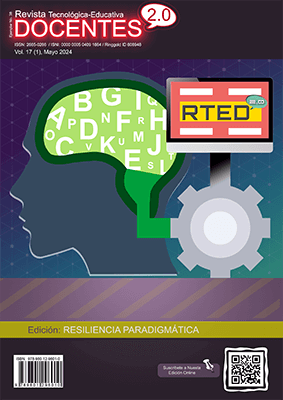Incidence of George Polya's Problem Solving Approach in the Variational Thinking’s Development
 DOI:
https://doi.org/10.37843/rted.v17i1.447
DOI:
https://doi.org/10.37843/rted.v17i1.447
Main Article Content
Abstract
Problem-solving has been a fundamental part of teaching mathematics, allowing it to satisfy the requirements when facing an everyday event. The objective of this study was to analyze the impact of George Pólya's approach to solving mathematical problems on the development of variational thinking, seen as one of the most recurrent problems in mathematics teaching. The application of a methodology under the naturalistic paradigm, Action Research method, qualitative approach, and interpretive type that allowed us to describe this difficulty in the sixth-grade students of the José Odel Lizarazo Villamaga educational institution, based on specific data taken from the plan proposed in the Pólya method. In this process, the phenomenon was approached from diagnosis and direct observation, the understanding and conception of problems through collaborative and cooperative work actions, and the implementation of mathematical resources and concepts to propose resolution options and reach a process of verification of the results. Once Pólya's proposal was executed, an evolution of variational thinking was evident in the key informants from its preoperational stage, where the initial difficulties in understanding the mathematical situations presented the weaknesses in the mathematical reading and writing process were recognized. Leading students to delve deeper into the inquiry, explore hypotheses, and propose solutions to the identified unknowns.
Downloads
Metrics
Article Details

This work is licensed under a Creative Commons Attribution-NonCommercial-NoDerivatives 4.0 International License.
Those authors who have publications in our journal accept the following terms:
- When a work is accepted for publication, the author retains rights of reproduction, distribution of his/her article for exploitation in all countries of the world in the format provided by our magazine and any other magnetic medium, optical, and digital.
- Authors will retain their copyright and guarantee the journal the right first to publish their work, which will be simultaneously subject to the Creative Commons Acknowledgment License (Attribution-NonCommercial-NoDerivatives 4.0 International (CC BY-NC-ND 4.0)). That allows third parties to copy and redistribute the material in any medium or format, under the following conditions: Acknowledgment - You must properly acknowledge authorship, provide a link to the license, and indicate if any changes have been made. You may do so in any reasonable way, but not in a way that suggests you have the licensor's endorsement or receive it for your use. NonCommercial - You may not use the material for a commercial purpose. NoDerivatives - If you remix, transform, or build from the material, you cannot broadcast the modified material. There are no additional restrictions - You cannot apply legal terms or technological measures that legally restrict you from doing what the license allows.
- Authors may adopt other non-exclusive license agreements to distribute the published version of the work (e.g., deposit it in an institutional archive or publish it in a monographic volume) provided that the initial publication in this journal is indicated.
- Authors are allowed and recommended to disseminate their work through the Internet (e.g., in institutional telematic archives, repositories, libraries, or their website), producing exciting exchanges and increasing the published work's citations.
- Request of withdrawal an article has to be done in writing by the author to the Editor, becoming effective after a written response from the Editor. For this purpose, the author or authors will send correspondence via e-mail: [email protected].
- The author will not receive financial compensation for the publication of his work.
- All Docentes 2.0 Journal publications are under the Open Journal System (OJS) platform at: https://ojs.docentes20.com/.
References
Acosta, L. L., Espinosa Montiel, G., & Cantoral, R. (2016). Pensamiento y Lenguaje Variacional y el Enfoque Por Competencias. https://n9.cl/gi4na
Barreriro, P., Casetta, I., Chacon, M., Gonzalez, V., Isla Suvialde, D., Leonial, P., . . . Rodriguez, M. (2019). Heurísticas en la resolución de problemas matemáticos. Ediciones UNGS.
Bejarano, M. A. (2016). La investigación Cualitativa. Innova Research.
Díaz Lozada, J. A., & Díaz Fuentes, R. (2018). Los Métodos de Resolución de Problemas y el Desarrollo del Pensamiento Matemático. https://doi.org/dx.doi.org/10.1590/1980-4415v32n60a03 DOI: https://doi.org/10.1590/1980-4415v32n60a03
Garcia Avella, G. A., Gaviria Tapia, A., Peralta Espinosa, A., & Romero Valor, L. A. (2017). Resolución de Problemas -Una Estrategia Para El Desarrollo Del Pensamiento Aleatorio En Los Estudiantes Del Grado Tercero De La Institución Educativa Francisco José De Caldas Del Municipio Paz De Ariporo -Casanare. Universidad de la Saller, 48.
Ministerio de Educación Nacional MEN. (2006). Estándares Básicos de Competencias en Lenguaje, Matemáticas, Ciencias y Ciudadanas. Ministerio de Educación Nacional.
Meneses Espinal, M. L. (2017). Método de Pólya como estrategia pedagógica para fortalecer la competencia resolución de problemas matemáticos con operaciones básicas en estudiantes de los grados tercero y cuarto del Colegio Municipal Aeropuerto. Tesis de maestría, Universidad Autónoma de Bucaramanga. http://hdl.handle.net/20.500.12749/2369
Mesa, P. A. (2009). Conceptualización de la razón de cambio en el marco de la Medellín. Universidad de Antioquia.
Polya, G. (1965). Cómo plantear y resolver problemas título original: ¿How To Solve It? Trillas.
Polya, G. (1989). Como Plantear y Resolver Problemas. Trillas.
Rios Peñaranda, C. J., & Navarrete Pita, Y. (2023). Estrategia didáctica para el Aprendizaje de las matemáticas en los estudiantes de tercero de bachillerato. Revista Estudios Social del Desarrollo de Cuba, 11(1). https://n9.cl/o5ejn
Sampieri, R. H. (2014). Metodología de la Investigación. McGraw Hill.
Santos Valencia, R. A., Chuc Can, F. A., Cadena Cupul, S. N., & Silva Cambranis, H. (2018). El método heurístico de Polya en un escenario de investigación. aplicación en un caso específico. Revista Electrónica Multidisciplinar de Investigacion y Docencia, 14.






